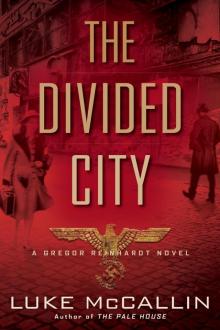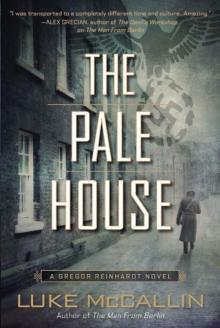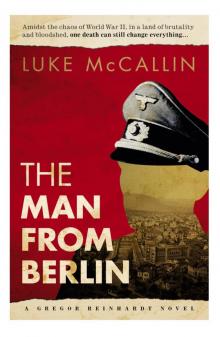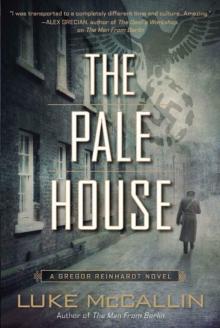- Home
- Luke McCallin
The Divided City Page 16
The Divided City Read online
Page 16
“My mother, Inspector. She was ill, and I needed to look after her.”
“What was wrong with her?”
Kausch ducked his mouth in the blanket to cough. In the hallway behind Kausch, Reinhardt saw several pairs of shoes. He looked at them, then back at Kausch, eyebrows raised for Kausch’s answer.
“Tuberculosis.”
“Is she here?”
“My mother? No.”
“And now?”
“Now what?” There was a sudden parade-ground snap to Kausch’s voice.
“Your mother? How is she?”
“Oh. I am afraid she passed away. Over the winter.”
“I am sorry to hear it. It wasn’t anything to do with Poles?”
“With what?”
“Poles. You weren’t worried about Poles?”
“I have no idea what you’re talking about, Inspector.”
“When did you last see Noell, did you say?”
“I didn’t. But it was months ago.”
“You weren’t close.” Kausch shook his head. “Weren’t friends? May I come in?” Reinhardt asked, again.
Kausch’s mouth moved, and he turned his head to dry cough, dragging it up and out of his mouth. There were small flecks of white in the fold beneath his ear.
Kausch coughed. “Inspector. I am very ill, and I have answered your questions. If there is nothing else . . . ?” He made to shut the door, but Reinhardt put a hand against it.
“You haven’t asked me.”
“Asked you what?”
“Why I’m asking about Noell.” Kausch blinked. “But maybe Ochs told you he’d been murdered when you went to see him yesterday.” Kausch blinked again. “Why did you go? Had you heard something?”
“I don’t know what you are talking about, Inspector.”
“Did you serve in Poland?” Reinhardt watched Kausch closely, but saw nothing in the man’s eyes, or in his face. “This place smells like a barracks. Damp towels, soup, and socks. Not a smell I care to remember. I really don’t care who is living in there with you, or what kind of scam you may be playing. Ration cards? Benefits? Something more serious, given the man you have up on the roof? So long as it and you and they had nothing to do with Noell’s murder, I am not interested. But I will be back, Mr. Kausch.”
21
“I have finished the autopsy of Zuleger,” Endres said, handing over a typed sheet of paper in his office at the morgue. “Without a doubt, he was killed by the same man that killed Noell and this other man, this Carlsen. Or a man trained to deliver blows in the same way. The time of death was sometime on Friday, I would say. Late on Friday.”
“Can you confirm what was left in the mouth?”
“Yes. Traces of sand, and more in the throat. In the esophagus, to be precise. But, more importantly, I have something else for you.” The professor’s hands played with a rough-edged folder of poor quality. It had a smeared stamp on the front and a series of handwritten notations. “It is, in my opinion, a loose approximation of a medical report, but . . .” He paused, his lips bunching as he considered what lay in front of him. “But I think the facts of this victim’s death correspond closely enough to those of Zuleger’s, and perhaps of Noell’s. You will tell me what you think,” he finished, handing over the file to a suddenly energized Reinhardt.
“An autopsy report?” Reinhardt passed over his packet of Luckies and his matches, settling back into the chair to view the file.
“If you call what they did an autopsy,” caviled Endres, absorbed in the glowing tip of his cigarette.
The “loose approximation of a report” Endres had found were the autopsy records of the body of a man discovered in a ruined building in early 1946. The autopsy had determined the cause of death to be a crushed sternum because of rubble found on and around the body. Dust had been found in the mouth, he read, wondering if it had been misidentified, and if it had been sand . . . The body had been found in one of the Western zones—the American one, again.
“You will have to see what sort of an investigation there was,” Endres said, as Reinhardt finished reading. “The evidence in there could easily be classed as circumstantial. I don’t think there were what we would term investigations at that time, I believe the authorities would have had other things on their mind. And the evidence therein is not conclusive of murder. Before you get carried away,” he said, tapping his cigarette into an ashtray, “you should remember Berlin was an unsafe city at that time, and young men—like that one had been—had a particular set of dangers to be endured or avoided, and not all of those dangers had been wearing Red Army uniforms,” he finished around a smooth drift of smoke, the slightest twist of irony in his voice.
“Your points are well taken, Professor, thank you,” said Reinhardt. “May I borrow the file? I will need to cross-check the references with what we have.”
“By all means.” He shifted in his seat as Reinhardt rose to leave. The smallest and slightest of gestures, a slide of his hand across his desk, but it was unaccustomed, outside of the ambit of Endres’s habitual control, and it made Reinhardt pause and take his seat again. Endres’s mouth moved, as if around something unexplained. “You will recall that photograph you showed me. The one you found at Noell’s apartment.”
“The one of him in air force uniform?”
“Precisely. I have found . . . someone. Someone who knows what it might be. This person would be willing to meet you. If you would find that interesting.”
Reinhardt kept his face blank as he stared back at the professor, considering what it was that unsettled a man as imperturbable as Endres. “I would be pleased to meet him, of course,” he said, eventually.
“It is settled, then,” said Endres, looking relieved as he reclined back into his chair. “I shall try to have you meet him soon.”
“I shall make the effort, Professor,” Reinhardt said, but his mind was already gone, questing ahead along this new path.
—
From the morgue he went to police HQ. When last Reinhardt had served in Berlin’s police, the headquarters had been at Alexanderplatz. The Alex, as it had colloquially been known, was a ruin now, bombed out, fought over and through during the Soviet assault back in May 1945. Everything still in the building had gone up in smoke—offices, records, files, archives, documents, forensics laboratories, morgue facilities, the telephone exchange, barracks, and dormitories, everything. The Alex’s shattered frontage now looked across the pitted expanse of the square at other buildings equally as damaged, a crescent of smashed and blackened façades that hid the tangles of devastation the war had wrought inside them. Although cleared of wreckage now, the surface of the platz still showed the scars of the fighting that had raged across it, the surface scarred and scorched where vehicles and fires had burned themselves out. In his mind, Reinhardt still remembered it as a place of light and movement, with windows lit and shops open, the flow of crowds and the dart and buzz of cars, one of Berlin’s arteries with the U-bahn and trains sliding in and out of the stations day and night.
Berlin’s main police HQ had moved to a building on Linienstrasse that had previously belonged to the DAF, the German Labor Front. It was in the borough of Mitte and, as buildings went, it was not a patch on the Alex, not in accommodation, not in location, and not in cachet. The Alex had had presence. It had been one of Berlin’s landmarks. One of the city’s fulcrums. No one knew how long the police would be in Linienstrasse. As long as the Soviets insisted it stay there, Reinhardt imagined, but perhaps it would be long enough for it to forge its own identity, but Reinhardt thought not as he entered the building. Its new masters would not give Berlin’s police any more authority than what they allowed. Or, as Reinhardt sometimes preferred to put it, just enough rope to hang themselves with if need be.
In Linienstrasse, he looked up the case file with the help of a surly records clerk, confirming t
hat the body had indeed been found in the American sector, in July 1946, but the man—Josef Stucker—had lived in the Soviet sector, in Friedrichshain. Moreover, he read, his heart picking up just a little, Stucker had had a family, and had been listed as ex-military because of a Wehrpass found on his body. The investigating officers had conducted little to no investigation, it not being obvious then that Stucker had been murdered, and his death had been put down as accidental. A finding, Reinhardt saw, that Stucker’s wife had rejected. He read her statement, noting her insistence that her husband had been concerned and increasingly worried, but unable to say to the detectives’ satisfaction what it was he had been worried about.
—
Stucker’s address was in an apartment that backed onto the Volkspark in Friedrichshain. The park used to be a lovely spot, one of the city’s older green spaces, with a beautiful cemetery to the south. The area had been shredded and raked by the war, and then by Berliners’ need for fuel to survive the bitter winters of 1945 and 1946. In the middle of the park, the colossal bulk of the Friedrichshain flak tower squatted like a wounded titan. The fortress had been split in two, the halves leaning away from each other, and millions of tons of rubble from ruins elsewhere in the city were being piled around its massive walls. The tower seemed to be drowning in the debris that now fringed it, the whole becoming a new landmark to the city’s postwar façade. Grass would grow there eventually, Reinhardt knew, trees as well, and a future generation of Berliners would have little to no idea what lay beneath the green hill they lay or walked on.
The widow’s apartment had once been in a fine building, now very run-down, reeking of damp, dust, bricks, and bad cooking. An old optician in a tiny shop with bells over the door that tinkled a discreet little chime directed him to a small laundry close by, where he found her. Reinhardt showed his warrant disc to the laundry’s owner, a pinched-looking woman with a hatchet for a nose and darting, suspicious eyes. The owner admitted that Mrs. Stucker worked here, and grudgingly allowed Reinhardt to speak with her.
Stucker was a tired-looking woman in her late thirties, hands reddened and raw from her work, blonde hair pulled back under a cloth cap on her head. She seemed surprised, then wary at his visit when he said he wanted to ask her questions about her late husband. She flicked a glance at the owner, who had retreated behind a high desk with a huge ledger upon it, then asked if he had a cigarette. Her eyes lit up as she saw his Luckies, and she swirled a shawl onto her shoulders as they stepped outside and went a little way away along the street. She took a deep pull on the cigarette, leaned back against the wall with her eyes closed at the sky, and nodded for him to ask his questions.
“Mrs. Stucker, last year you mentioned in your statement that your husband was worried about something.” She nodded. “Can you elaborate a little more?”
“Why? Why now? Why you? Back then, your colleagues weren’t interested. They didn’t listen.”
“I’m not them, Mrs. Stucker. That’s all I can say. And perhaps you can help in more ways than you know. So, please . . . ?”
“Josef came back from the war in early 1946, from a prisoner-of-war camp. An Allied camp, thank God. Things were hard, but all right. He never talked of his war. Before he came home, I had not seen him in about a year. He had changed, but he wasn’t unrecognizable. He managed to find work. We were getting by. Then, one day, he came home worried. The next day was worse. He was convinced someone was following him. He would not say who he thought it was, just that it was ‘something from the war.’” She paused, her mouth and chin firming as she remembered. “The next day,” she continued, around a long breath of smoke, “he went to work, but never came back. The day after that, I reported him missing to the police station. A day or so later, they found his body.” Over her shoulder, the laundry’s owner poked her head out, looking at Reinhardt with flat, beady eyes.
“He said nothing about any trouble?” She shook her head. “Black marketeers? The Allies? The Russians? His war service?”
“I’ve no idea. He said nothing, except that one time. That whatever was bothering him, it was something from the war. That’s all.”
“He had his Fragebogen?”
“Yes. Denazified and Persil white,” she said, shortly. “Got the certificate to prove it.”
“Who was the last person to see him alive?”
“His boss. Emil Krey,” she said, confirming the information in the police file. “He ran a little electricians’, but he’s dead now. Pneumonia, over the winter. But his business is still going. I’m not even sure the police checked with him,” she finished, with a bitter twist of her mouth as she flicked the stub of her cigarette out across the street. The laundry owner peered out again, and this time hissed her displeasure beneath her breath at one of her employees idling in the street.
“What did he do during the war?”
“Air force pilot. Why?” Stucker asked, seeing Reinhardt tense up.
“Do you know what squadron? Or where?”
“He was a fighter pilot. He was posted pretty much everywhere.”
“The name of the squadron? Or the number?”
“I don’t know. But I have his Wehrpass at home.”
“I would like to see it, please.” The owner stepped out of the laundry, hands on hips, and Reinhardt snapped his warrant disc out at her. “This is police business, woman!” he said brusquely. “Kindly stop bothering me, and mind your own bloody affairs.”
“It’s all right,” Stucker murmured, tightening her shoulders beneath the shawl. “It does not . . . pay . . . to annoy her. She has connections in the administration.”
Reinhardt felt immediately contrite, angry as always at himself for losing his temper. He hated doing it; the consequences were invariably unpredictable. “I’m sorry,” he murmured. “I hope . . .”
“Forget it,” Stucker interrupted him. “The apartment is not far, if you want to come now?”
“Lead on, then, thank you.”
He followed her back to her block of flats, waiting in the hallway of her apartment, as she vanished into one of the further rooms. He stared at a little corner of the living room that resembled a colored sanctuary of pillows, books, and toys, where a rag doll slumped across the arms of a little chair, and a furry bear lay facedown across a mismatched china tea set. The sight froze him, and he did not realize it had taken up so much of his attention until Stucker was standing in front of him, her husband’s Wehrpass held out in one hand and her head cocked quizzically.
“I’m sorry. I apologize,” he managed, fumbling the book from her hand.
“It’s . . . nothing,” she said, the smallest of frowns creasing her brow.
“It’s only, I haven’t . . .” He swallowed, feeling foolish, feeling a need to explain. “I haven’t seen . . . haven’t seen color, a child’s colors, in a long time. Your daughter?” Stucker nodded, and Reinhardt felt desperately uncomfortable, even voyeurish, and he fixed his gaze instead on the Wehrpass, freezing as he read out Josef Stucker’s squadron.
III./NJG64. And before that in IV./JG56.
How could it have been anything else? he wondered.
“Mrs. Stucker, may I take this for my inquiries? I will bring it back.”
“Take it, take it, for all the bloody good it does me,” she said bitterly. “No benefits, no pension, nothing for Jozef’s career, nothing for his family but what I can eke out.” She tightened herself, giving a small, sharp shake of her head. “My turn to apologize,” she said, from under lowered eyes.
“I understand, Mrs. Stucker. I, too . . .” but the words, all of a sudden stuck in his mouth, like something dry, mealy. “I, too, was a member of the armed forces.”
“What’s done is done,” she said, and the words fell meaningless between them, just sounds, the type two people made when they no longer knew what to say to each other, or about anything.
Reinhardt too
k a long breath in, and made to leave. A last glance around the apartment, and he noted something that a quick check of the Wehrpass confirmed. “This was where you were living before the war?”
“Oh, yes!” she laughed, and for a moment there was a glimpse of the handsome woman she had been as she raised one hand to brush a stray wisp of hair back over her ear, darting her eyes around as if looking for something misplaced, then pointed out the window at the hulk of the buried flak tower. “You wouldn’t believe the noise when that thing was in operation during an air raid, but we were quite safe here. Almost no bombs landed anywhere. And when the Ivans were coming through, well, we took shelter in the tower with half the neighborhood.” She stopped, her fingers kneading themselves white, then she gave a quick smile. “When I think of the luck!” she finished brightly, but there was a brittle cast to her voice.
A rap at the door announced a little boy with a message from the laundry owner that Mrs. Stucker was to return at once. Reinhardt encouraged her to go, not wanting to get her into any more trouble. As they walked out the front door, as Stucker draped her shawl around her shoulders, she turned to him, an earnest look to her, but trepidation lurked there in the corners of her eyes.
“Look, don’t take this the wrong way, but . . .” Reinhardt frowned at her as she visibly firmed herself up. “When you talked of . . . of my daughter’s things . . . Do you have anyone? I mean, are you with someone?”
Reinhardt blushed furiously as he realized what she was asking, although it was not the first time he had been propositioned in this way. There were simply too few men, or so he had been told.
“You seem like a nice man, and you’re not unpleasant on the eye.” She twitched a smile. “And you’re here. There’s too many men that aren’t. I just thought . . . The times, you know. It makes things different. So, if you wanted someone, I could maybe . . . It’s just me and the little one, but she doesn’t make any trouble, and I could take good care of you.”

 The Divided City
The Divided City The Pale House
The Pale House The Man from Berlin
The Man from Berlin The Pale House (A Gregor Reinhardt Novel)
The Pale House (A Gregor Reinhardt Novel)